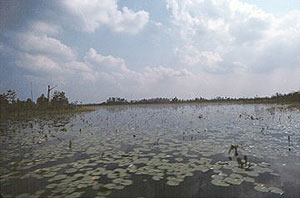
ATLANTA – A state senator from coastal Georgia is calling for a closer examination of the potential impacts of a planned titanium mine near the Okefenokee National Wildlife Refuge.
In a letter dated Jan. 27, Sen. William Ligon, R-Brunswick, suggested the U.S. Army Corps of Engineers conduct more studies on how mining a 12,000-acre site south of the refuge in Charlton County and post-mine restoration would alter surface water and groundwater flows before awarding a permit to Alabama-based Twin Pines Minerals.
“Science must guide decisions that affect our swamp and the national wildlife refuge,” Ligon wrote in the letter to Col. Daniel Hibner from the Corps’ Savannah district. “These studies … must demonstrate, beyond a reasonable doubt, that no harm will come to the swamp as a result of Twin Pines’ mining operations. Our state cannot risk lasting damage to the national treasure that is the Okefenokee Swamp.”
Ligon noted in the letter that the Okefenokee National Wildlife Refuge draws more than 600,000 visitors each year. The Okefenokee is the largest blackwater swamp in North America.
The Georgia Conservancy complained last August the proposed mine would go an average of 50 feet below the surface, deep enough to impact adjacent wetlands and permanently affect the hydrology of the entire 438,000-acre swamp.
The U.S. Environmental Protection Agency, U.S. Fish and Wildlife Service and the Georgia Environmental Protection Division also have expressed concerns about the project.